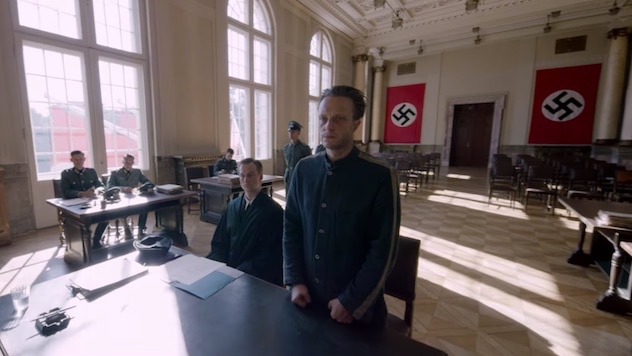Telluride 2019: A Hidden Life
“The world is drowning,” a character utters.
Terrence Malick is known for his uncompromising films about love, life, and the ever questioning morality of God. So it’s no surprise that A Hidden Life tackles all of these ideas and many more over its 173 minute runtime. Visually, it was the most beautiful film at this year’s Telluride Film Festival. Malick’s long-time collaborator Jorg Widmer (who cut his teeth as a camera operator on many of his more recent films) beautifully captures its scenic landscapes in his most recent cinematic endeavor.
Franz Jaggerstatter (August Diehl) and his wife Frannie (Valerie Pachner) live on a farm in a small town in Austria. They have three adorable daughters, are loved by their neighbors and friends, and are described as an undeniable asset to their community. Their lives are turned upside down when Franz is called to war, throwing his moral word upside down in the process. Franz returns from bootcamp in one piece, but can’t help but question the direction in which his country is headed. He can’t watch innocent lives be destroyed, for a purpose he himself does not understand. A member of the local church, Jaggerstatter’s beliefs and understanding of God come into direct moral conflict with the actions of the war. “If our leaders, if they’re evil, what do we do?” Franz asks his priest. “You have a duty to the fatherland” he’s told. Does one give themselves over to patriotism in the face of cruelty?
It’s 1943 and Adolf Hitler is at the height of his power, and communities around Franz are progressively turning into zombies, following his every order and praising him as the second coming of God. A man that saved their country. Franz and Frannie cannot sit by and tolerate the praise and adoration. It’s then that Franz is requested to report for duty again. Franz does not wish to fight in the war, refusing to swear allegiance to Hitler. Threatened with jail time and even death, does he stand up for what is right, or does he run away in hopes that he might outlive the war in hiding? Frannie doesn’t want Franz to leave, but understand when Franz knows he has an obligation to stand for what he deems is right. He goes to his nearby recruitment camp at the request of his draft letter, but instead of reciting the oath to serve Adolf Hitler and fight alongside the Nazis, he abstains and stays silent and is thrown in jail for treason.
A Hidden Life is a heartbreaking and beautiful story that was inspired by true events. Many people will probably claim this film to be too dull, too insular, and too pretentious, but I was entranced with Malick’s gorgeous landscapes and his thought provoking meditations on war and its purpose. He created a film that when juxtaposed with unfortunate events happening in the world today, only resonates with further power. His style in this film is reminiscent of The Tree of Life, which should make many Malick fans excited. Just like many of Malick’s other films, its extraordinary beauty cannot be stressed enough. Each and every frame of this movie could be framed and hung on the wall in a museum.
Personally, I adored this film. I understand this won’t be for everyone, but it could not have worked better for me. I haven’t seen Malick’s last two films, so I cannot attest to them, but A Hidden Life feels like a restrained, narrative driven Malick and I ate up every second of it. The three hours went by so fast I hardly even noticed. The lead actors, their dedication to each other and their idealistic views on the war are incredibly lovely to watch unfold. And more than one time that I had tears streaming down my face, especially seeing Bruno Ganz in his last role before he passed earlier this year.
Whatever you think about A Hidden Life, there’s no repudiating Malick’s testament to the complexities of life. “If God gives us free will, we’re responsible for what we do.” There aren’t other filmmakers that are as capable of making movies about these inscrutable, existential questions. Questions only Malick seems capable of addressing. It’s artistry at its finest and another example of Malick’s singular cinematic voice.














